“The difference between George Lucas and Gene Roddenberry is that Roddenberry had the good sense to die.”
J. Marcus (1998-present)
Yep, I have said that phrase out loud for more than a decade. What I mean by that, in a nutshell, is that Roddenberry had not only been marginalized by Paramount by the time Star Trek VI was released, but when he died, he effectively and permanently severed all ties to the franchise, meaning that whatever went wrong from that point on could no longer even remotely be blamed on him.
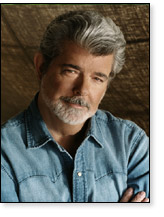
Image courtesy of Lucasfilm Ltd.
Lucas, on the other hand, was the tyrannical leader of his franchise and was therefore responsible for any and all tinkering with his product, and could be held accountable for the many ways in which Star Wars began to suck.
I am, by all accounts, a Star Trek fan. I’m not the stereotypical Trekkie (I don’t walk around in funny outfits, I can’t speak Klingon and I don’t remember every single factoid from over 30 years of canon). I like Trek because I liked the storytelling and I thought the designs were cool.
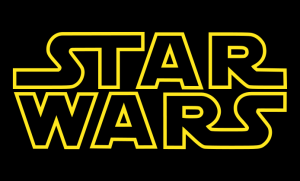 For the better part of my youth, Star Wars ran a distant third (behind Superman) for more or less the same reasons. Unfortunately, my infatuation with the franchise came to an end when the prequel trilogy was released. Those pieces of dreck, coupled with all the nonsense that surrounded the tinkerings with the original trilogy, effectively killed whatever real love I had for those films. In my mind, liking them just became too much work.
For the better part of my youth, Star Wars ran a distant third (behind Superman) for more or less the same reasons. Unfortunately, my infatuation with the franchise came to an end when the prequel trilogy was released. Those pieces of dreck, coupled with all the nonsense that surrounded the tinkerings with the original trilogy, effectively killed whatever real love I had for those films. In my mind, liking them just became too much work.
More recently, however, I’ve come to a point where I’ve wanted to analyze what it was about Star Wars that I liked and who was really responsible for it all. Of the original trilogy, arguably, my favorite part was the music. 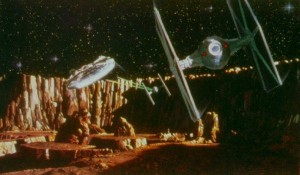 For that, I can give full credit to John Williams who composed it all. Granted, it was Lucas’ “vision” that he wanted music that was inspired by the “Flight of the Valkyries” and so forth, but it was the magic quill of Williams that brought that music to life. Lucas had final say, but Williams made it happen, plain and simple.
For that, I can give full credit to John Williams who composed it all. Granted, it was Lucas’ “vision” that he wanted music that was inspired by the “Flight of the Valkyries” and so forth, but it was the magic quill of Williams that brought that music to life. Lucas had final say, but Williams made it happen, plain and simple.
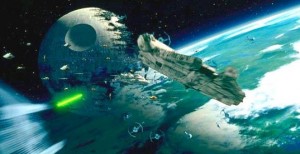 Next up? The special effects. This is a bit of a sticky wicket because the effects were done by Industrial Light and Magic, a Lucasfilm company. At the time of the first film, however, this wasn’t quite as explicit as it is now. And we can’t forget that while most of the designers names aren’t as public-knowledge as Matt Jeffries (the guy who designed the U.S.S. Enterprise), there were some talented folks at ILM who designed these ships and came up with the technology to make them fly (like John Dykstra — creator of the Dykstraflex camera).
Next up? The special effects. This is a bit of a sticky wicket because the effects were done by Industrial Light and Magic, a Lucasfilm company. At the time of the first film, however, this wasn’t quite as explicit as it is now. And we can’t forget that while most of the designers names aren’t as public-knowledge as Matt Jeffries (the guy who designed the U.S.S. Enterprise), there were some talented folks at ILM who designed these ships and came up with the technology to make them fly (like John Dykstra — creator of the Dykstraflex camera).
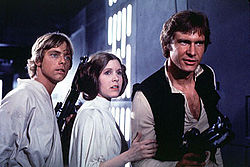 Next was the impeccable acting in the series. Yes, as with all films, a certain amount of praise can be lauded on the director for getting the performances out of the actors, but anyone who knows film knows that this is a two-way street. If the raw talent isn’t there, the director isn’t going to be able to do anything about it. And while the performances weren’t necessarily Oscar-worthy, they more than got the job done.
Next was the impeccable acting in the series. Yes, as with all films, a certain amount of praise can be lauded on the director for getting the performances out of the actors, but anyone who knows film knows that this is a two-way street. If the raw talent isn’t there, the director isn’t going to be able to do anything about it. And while the performances weren’t necessarily Oscar-worthy, they more than got the job done. 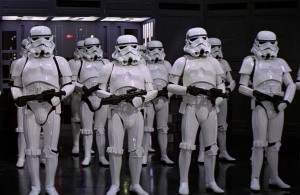 These characters were brilliantly brought to life by actors who made these people and situations real (I mean, how many people can successfully act scared when faced with a row of stormtroopers dressed in tupperware?)
These characters were brilliantly brought to life by actors who made these people and situations real (I mean, how many people can successfully act scared when faced with a row of stormtroopers dressed in tupperware?)
For me, the story came last in these films. I guess that makes me fickle. I guess that also makes me an immediate ancestor to the attention-deficit audience we have for films today. Or maybe it’s something more. Maybe it’s that the stories for the original trilogy were a means-to-an-end. They were the maguffins of their respective films and maybe that’s why they don’t hold up under scrutiny.
Being a visionary doesn’t necessarily make you a good storyteller. It just means that once you have the story, you can tell it with style. Maybe George Lucas’ biggest crime (if he can be accused of committing one at all) is that he is a better visionary than he is a storyteller.
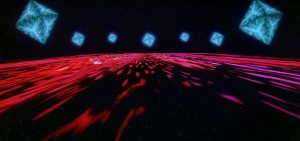 Take 2001: A Space Odyssey. Visually, it was a stunning piece of work, light-years ahead of its time. Storywise? It’s boring as sin and could be considered one of the biggest wastes of ticket-money in the history of cinema. The story, once again, is an excuse for the visuals and technical achievements of the film.
Take 2001: A Space Odyssey. Visually, it was a stunning piece of work, light-years ahead of its time. Storywise? It’s boring as sin and could be considered one of the biggest wastes of ticket-money in the history of cinema. The story, once again, is an excuse for the visuals and technical achievements of the film.
In the prequel trilogy, Lucas simply tried too hard to live up to all the expectations that the fanbase had built for him.
End of story?
Not quite. Lucas does have a fatal flaw. As much praise as the public was willing to heap upon him for the original films, he was that willing to take responsibility for it all and even embellish a bit. And this is where the good man turned bad.
Lucas got out in front of it all during the making of The Empire Strikes Back. According to the Star Wars Wiki, Lucas had this to say while on set back in 1979:
“The first script was one of six original stories I had written in the form of two trilogies. After the success of Star Wars, I added another trilogy. So now there are nine stories. The original two trilogies were conceived of as six films of which the first film was number four.”
Let’s take a moment to breathe in the gravity of what he said way back when. 9 stories… the first film was number four…. three trilogies. Taken at face value, this man is a bloody genius! He had the whole thing plotted out in 1977.
Reading the original treatment of Star Wars, one finds a very different film from what made it to the screen. That’s normal. No one would begrudge Mr. Lucas that. Accordingly, however, if all the other stories were based on the original treatment, they would have to be amended to fall in line with this new vision. Based on Mr. Lucas’ statement in 1979, however, this shouldn’t be a problem.
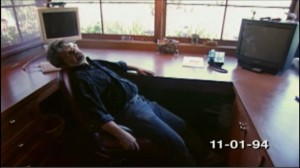
The full video can be seen in "The People vs. George Lucas"
Fast forward to a home movie that Lucas shot in his office as he was sitting down to write what would become Episode I: The Phantom Menace. In the video he gathers his pencils at his desk, sits down in his chair and laments that now he must come up with an idea…
WHAT HAPPENED TO ALL THOSE IDEAS FROM 1979?!?!?!
The easy answer could be that Lucas hyped himself up as a genius, bought into it, and later forgot all about it and realized that now he had to deliver on promises that he had made nearly twenty years ago. Or maybe there’s another, more innocent, explanation. At this point, who do you believe?
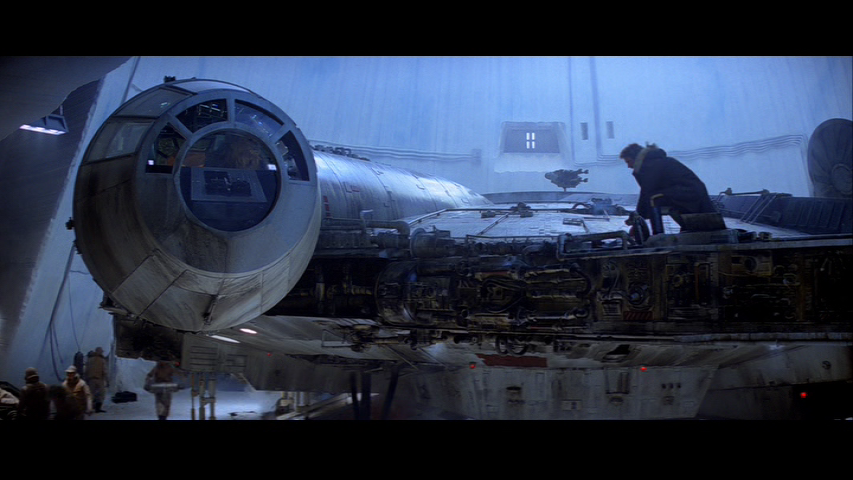 I used to work in television. One day I was asked to find a nifty fact to go along with how much it costs to manufacture the space shuttle. So I thought I’d find out how much it cost to build the full-sized Millennium Falcon for Star Wars! You know, the one you see Harrison Ford crawling all over in The Empire Strikes Back? So I used some contacts and got a hold of the Lucasfilm PR department. From there I got transferred to their archivist where I asked, point blank, how much it cost to build it. I was told, categorically, that there was never a full-sized Falcon, and that they only used miniatures.
I used to work in television. One day I was asked to find a nifty fact to go along with how much it costs to manufacture the space shuttle. So I thought I’d find out how much it cost to build the full-sized Millennium Falcon for Star Wars! You know, the one you see Harrison Ford crawling all over in The Empire Strikes Back? So I used some contacts and got a hold of the Lucasfilm PR department. From there I got transferred to their archivist where I asked, point blank, how much it cost to build it. I was told, categorically, that there was never a full-sized Falcon, and that they only used miniatures.
I told the archivist how I had read somewhere about how the production company had hired famous ship-builders to build the ship. I was told that she would go back and do some research for me and get back to me later that day.
Sure enough, later that day I got a call back and was told, again, that there had never been a full-sized Millennium Falcon. Period.
Fast forward to a few years later when the full-sized prop was sold at auction. Go figure. By the way, here’s a story about the construction of the prop…
What was the point of that story? Simply that if Lucasfilm can’t get a reasonably large detail like that straight, how can we ever be expected to get the truth about these films? Time skews perceptions and with so many contradictory video/print sources on who said what and when… the true answers to the creative origins of these films may be lost to time.
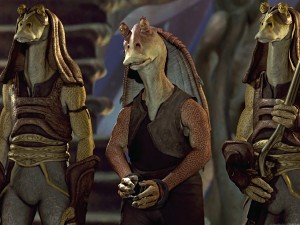 But what we do have is the proof of today. In modern lore, for the old-school Star Wars fan, everything Lucas touches turns to crap. On the other hand, he has done a magnificent job of indoctrinating a new generation who not only love the new trilogy and its spin-off animated series, but who even embrace Jar Jar Binks!
But what we do have is the proof of today. In modern lore, for the old-school Star Wars fan, everything Lucas touches turns to crap. On the other hand, he has done a magnificent job of indoctrinating a new generation who not only love the new trilogy and its spin-off animated series, but who even embrace Jar Jar Binks!
The problem that has arisen is, as I mentioned before, the attention-deficit audiences of today. I believe, in my heart of hearts, that if the original trilogy were released for the first time in theaters today it wouldn’t be nearly as successful. 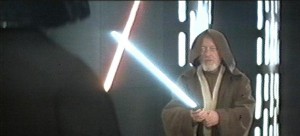 The pacing is kind of slow. The story is kind of weak. The fights are kind of lame (hell, in the first film, the lightsaber duel is almost boring).
The pacing is kind of slow. The story is kind of weak. The fights are kind of lame (hell, in the first film, the lightsaber duel is almost boring).
The prequel trilogy may stand as an eyesore to Star Wars fans of old because they represent the dynamic change in the audiences who consume media. Lucas probably did the right thing and targeted these films to the modern audience and not to the fans, thereby ensuring that a new generations of fans will be born rather than just appeasing the fans of yesteryear. It hurts, but it’s true. The prequel trilogy represents everything that old film fans hate about the new film audiences.
Vitriol like the stuff I spouted at the top of this article comes from a very simple place. Fandom. As fans, we don’t like it when someone makes something we love less than what it is. By appeasing these new audiences Lucas did just that, but he also did something more. He ensured that the franchise will endure beyond the size and scope of his original trilogy.
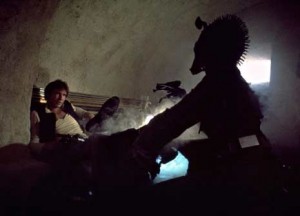 And what of his tinkering with our films… does he have that right? Absolutely. Just as much as we have the right to resent it and not participate. What we choose to do with these powers is just as important as when he chooses to exercise his.
And what of his tinkering with our films… does he have that right? Absolutely. Just as much as we have the right to resent it and not participate. What we choose to do with these powers is just as important as when he chooses to exercise his.
So who is George Lucas at the end of the day? Is he a saint or is he a devil? Maybe he’s just a visionary who got caught up in a field that was not his own and who is making the best of it… whether we like it or not.
Fab Post! Everyone check out the documentary “The People Vs. George Lucas” to figure out for yourself!